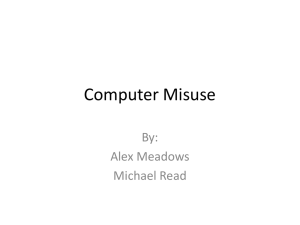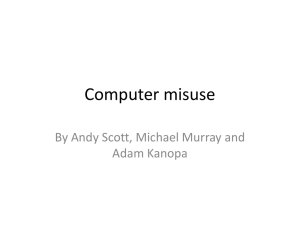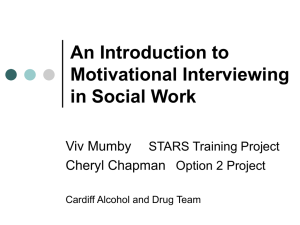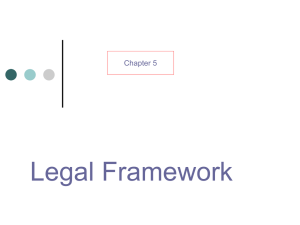The Legal Framework - Computing and ICT in a Nutshell
advertisement
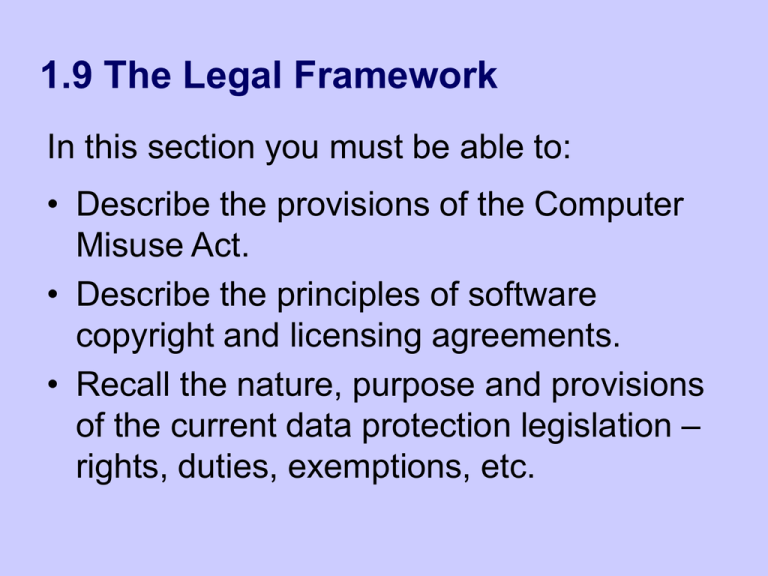
1.9 The Legal Framework In this section you must be able to: • Describe the provisions of the Computer Misuse Act. • Describe the principles of software copyright and licensing agreements. • Recall the nature, purpose and provisions of the current data protection legislation – rights, duties, exemptions, etc. New Crimes Made Possible by ICT New technology has created opportunities for crime: • Software piracy (copying software illegally to sell) • Hacking (unauthorised access to computer systems) • Creation and distribution of viruses • Distributing pornographic and other obscene material • Fraudulent trading • Credit card fraud • Terrorist activity and blackmail Abuse of ICT There are also opportunities for the abuse of ICT: • Sending unsolicited e-mails (now an offence in some countries) • Creating inappropriate or misleading web-sites • Registering a domain that might appear to belong to someone else – “cyber-squatting” Inappropriate use of ICT is not necessarily illegal. It’s important to distinguish between: • Unethical use of ICT – i.e. morally questionable • Criminal activity – i.e. an offence under the various laws covering use of ICT Where do Laws Come From? There are three sources of law: • Case law – i.e. judges’ rulings in court cases • Acts of Parliament – e.g. Data Protection Act • European laws & directives – e.g. VDU use Laws change for many reasons: • Social and political pressure – e.g. dangerous dogs • Reaction to specific cases – e.g. Gold & Shiffreen • Combinations and clarifications of previous laws • To close loopholes – e.g. “making off” and hacking Laws Affecting ICT There are various laws covering use of ICT • Computer Misuse Act 1990 • Data Protection Act 1984 & 1998 • Copyright, Designs and Patents Act 1988 • European VDU & health directive 1992 Plus, more general guidelines such as: • Health and Safety legislation • Offices, Shops and Railways Act 1963 • Contract law – shink-wrap agreement controversy! Plus what about things such as professional advice given by a computer? Computer Misuse Act • In 1988 two teenagers “hacked” the Duke of Edinburgh’s e-mail account and changed a message • They were taken to court, but hadn’t actually committed an offence (there was no theft and no fraud committed) • People also started getting worried about viruses, which had started to appear in 1986 • In response, the government introduced the Computer Misuse Act in 1990 Computer Misuse Act Under the CMA there are three offences: • Unauthorised access to computer programs or data • Unauthorised access with further criminal intent • Unauthorised modification of computer material (programs or data) However… • Unauthorised access can be difficult to detect • The first people to be prosecuted (in 1997) were caught when boasting about their crime! Computer Misuse Act The CMA therefore protects us against: • Hacking • Theft and Fraud • “Logic Bombs” • “Denial of Service” attacks • Viruses could commit offences at different levels depending on the payload: – Some display harmless messages – Some are deliberately malicious – Some are unintentionally dangerous Other Measures to Prevent Misuse Other steps can be taken to prevent misuse. • JavaScript, for example, was created with computer misuse in mind and was designed to prevent it being used to create viruses: – JavaScript cannot write directly to discs (other than cookies) and so cannot delete or change any files – There is no direct access to memory or to other hardware Copyright and Patent • Patents cover the ideas and concepts on which products or services operate: – You can only patent software that performs a technical function – e.g. an encryption algorithm – You can’t patent software that performs a human function, such as translating English to French • Copyright covers the implementation of the idea – the actual words, images and sounds that you use Copyright, Designs and Patents Act • Under this act it is illegal to: – Copy software – Run pirated software – Transmit software over a telecommunications link (thereby copying it) • The act is enforced by FAST – the Federation Against Software Theft (also FACT for general copyright) • The enforcement is complicated by: – The confusion between copyright and patent – Whether you can copyright a “look and feel” – Contracts such as licensing and acceptable use agreements Using Computers to Combat Crime Computers can also be used to solve crimes: • The Police National Computer (PNC) now allows forces across the country to share information • Number-plate recognition can be used to identify people committing motoring offences • Mobile phone records can be used to locate criminals and victims of crime • Audit logs and records of e-mails and network traffic could be used as evidence Data Protection • We all have a right to privacy • There might be a variety of reasons why you’d want to keep something private: – It might be possible to using the information for fraudulent purposes – The information might be of a sensitive nature, such as medical records – You might just not want people to know! • The Data Protection Act is to protect privacy Data Protection Act The Data Protection Act… • Was introduced in 1984 and updated in 1998 to create a standard for data protection across Europe • Originally covered personal data that are automatically processed but now covers some manual records as well • Defines the terms data subject (the person about whom data is held) and data controller (called data user in the 1984 version) • Requires that all data controllers (and the nature of the processing they do) must be recorded on the public register of data controllers • Is overseen by the Information Commissioner Data Protection Act – Eight Principles Under the Data Protection Act, data must be… • fairly and lawfully processed; • processed for limited purposes and not in any manner incompatible with those purposes; • adequate, relevant and not excessive; • accurate; • not kept for longer than is necessary; • processed in line with the data subject's rights; • secure; • not transferred to countries without adequate protection. Processing Personal Data • Personal data covers both facts and opinions about the individual. It also includes information regarding the intentions of the data controller towards the individual. • Processing can only be carried out where: – the individual has given his or her consent; – the processing is necessary for the performance of a contract with the individual; – the processing is required under a legal obligation; – the processing is necessary to protect the vital interests of the individual; – the processing is necessary to carry out public functions; – the processing is necessary in order to pursue the legitimate interests of the data controller or third parties Data Protection Act – What Else? • It covers any information recorded as part of a “relevant filing system” – i.e. information that is “readily accessible” • Data controllers must take security measures to safeguard personal data – i.e. to prevent unlawful processing or disclosure • There are certain exemptions from the DPA • Data subjects have rights that are defined in the act DPA – The Rights of Individuals If data are held about you, you are entitled to be… • given a description of the data told for what purposes the data are processed • told the recipients or the classes of recipients to whom the data may have been disclosed • given a copy of the information with any unintelligible terms explained • given any information available to the controller about the source of the data • given an explanation as to how any automated decisions taken about you have been made DPA – The Rights of Individuals Further rights include: • The right to access the data held – within 40 days and at a cost of no more than £10 for computer records and £50 for paper records • The right to rectify, block, erase or destroy details that are inaccurate, or opinions based on inaccurate data • The right not to have your details used for direct marketing • The right to compensation for damage caused if the Data Protection Act is breached Exemptions from the DPA The Act does not apply to: • Payroll, pensions and accounts data • Names and addresses held for distribution purposes • Personal, family, household of recreational use • Data can be disclosed to an agent of the subject, or in response to a medical emergency • Use of data in cases dealing with national security, the prevention of crime, or the collection of taxes & duty Criminal Offences under the DPA • Notification offences – where the data controller fails to notify the commissioner of processing or changes to processing • Procuring and selling offences – disclosing, selling or obtaining data without authorisation • Enforced access offences – e.g. you can’t make someone make an access request as a condition of employment • Other – such as failure to respond to a request or to breach an enforcement notice Freedom of Information Act • Covers all types of 'recorded' information held by public authorities • Covers personal and non-personal data • Public authorities include: – Government Departments – local authorities – NHS bodies – schools, colleges and universities – the Police – Parliament – The Post Office – The National Gallery – The Parole Board – Plus lots, lots more!
